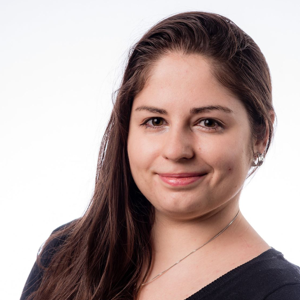Meet TTS Scholar Vesela Petrova, Class of 2020-21
Vesela Petrova isa Bulgarian architect with a passion for innovation and sustainability. Vesela is a joint TTS – Fulbright Scholar in pursuit of a post-professional Master’s of Advanced Architectural Design degree from Cornell University.
Can you tell us more about the time you’ve dedicated to projects in the field of education in Bulgaria, and how a Masters of Advanced Architectural Design will help you further this work?
I am a firm believer in the importance of education and that the environment we study in has a direct impact on student’s desire to learn. It should also be a safe and secure environment for the students – their second home. It is often challenging for Bulgarian schools to get architects ready to invest time in creating an innovative and unique design as the schools often have limited funding.
I dedicate my free time to creating school designs in my hometown and hopefully in the future in other places as well. Many Bulgarian families determine their residence based on the educational environment. My goal is to design equal opportunities for children regardless of where they live. My current education is giving me an insight into a new educational system and a new perspective on pedagogy that I hope I will be able to incorporate in projects back home.
A number of buildings on the Cornell campus are landmarks with historic designations. Have any of these had an influence on your thinking?
I have been fascinated with the Cornell campus ever since I visited in 2017. Experiencing it, walking around and enjoying the surrounding nature are part of the reason why I want came back to study here. Pinpointing a single building as more impactful than another is hard as they have all impacted the way I think, however I think the campus as an open ensemble seamlessly integrated in nature and its atmosphere have affected my perspective on life.
We understand you have a unique perspective on architecture based on sustainability and functionality highlighted by your research in implementing humanoid robots as mobile architectural elements. Can you give us a layman’s explanation of what this means?
In a nutshell, I guess I don’t see architecture as something that has to be limited to a static interrelation between elements such as walls, ceiling and floor. I see enormous potential in utilizing the synergy between software and physical architecture for the benefit of the user through the incorporation of mobile technologies in architectural design. I also think that in some aspects this could lead to a design being more sustainable by allowing for non-invasive augmentation and adaptation as opposed to demolition of what exists in order to create something new.
What is your point of view on the current state of architecture in Bulgaria as a former Eastern European Bloc country?
This is a bit of a tricky question. To me the former Eastern European Bloc concept is something abstract that I have experienced predominantly through the prism of what my family has told me about it. At the same time in the end of the 19th and in the beginning of the 20th century a lot of the Bulgarian architecture was designed after Vienna of the time, often by Viennese architects. After having spent 10 years in Vienna and studying architecture there, I can’t help but compare Sofia to Vienna. There is a clear impact Socialism has had on the development and preservation of architecture in Bulgaria. I think there is room for improvement, but I also hope Sofia will one day again be comparable to the best city to live in in the world.
Has the current COVID pandemic affected your thinking about architectural spaces in general?
I would not say that my overall perspective on architecture has changed. If anything, the pandemic has reiterated the importance of personal space and spaces that encourage people to inhabit them. It has also brought home the need for accessible public spaces in cities and emphasized the need to reconnect with nature.
Can you share with us a positive aspect of the current pandemic?
I’m enjoying both in-person and virtual classes at Cornell, more than what my friends in Europe are able to enjoy and for this I am incredibly grateful. One should never give up on reaching for the sky and following dreams. I do this by meeting inspiring people that enrich my world, broaden my horizon and open my eyes to new possibilities.
Interview conducted March 2021
